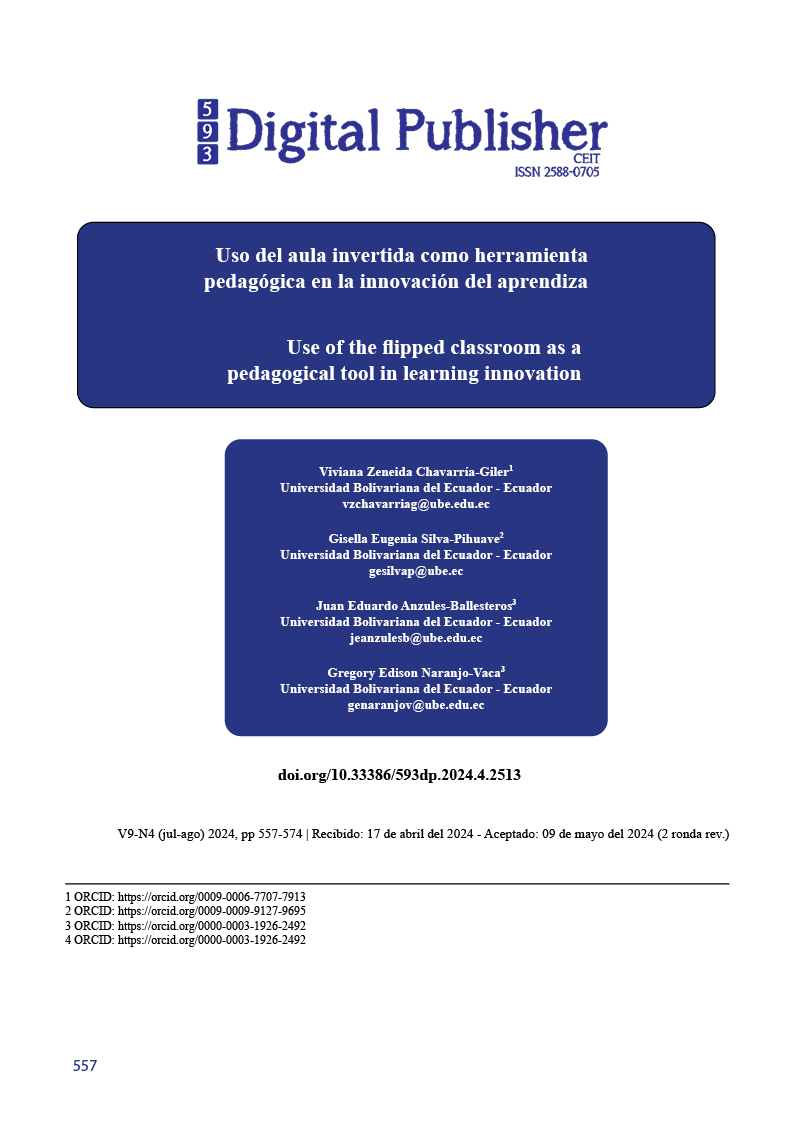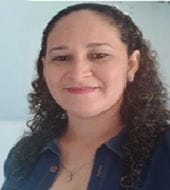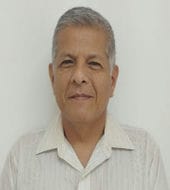Use of the flipped classroom as a pedagogical tool in learning innovation
Main Article Content
Abstract
The main objective of this study was to identify the impact of using the flipped classroom as a pedagogical tool on learning innovation. To achieve this objective, an experimental study was designed, which included the application of surveys to a representative sample of 150 students. The surveys focused on evaluating students' perception of the usefulness of pre-recorded content provided before class with a Cronbach's alpha of 0.893, the benefit of practical activities in the classroom, the level of engagement with the subject, the improvement in the understanding of the concepts taught, the ease of use and the usefulness of the digital pedagogical tool, as well as the perception of its impact on motivation and collaboration. Due to the significance values of the KS1 test, Spearman's correlation coefficient was used to analyze the relationship between the studied variables. The results obtained show a positive and significant correlation between the implementation of the flipped classroom, the use of digital pedagogical tools and the perception of innovation in learning. It was found that both the flipped classroom and digital pedagogical tools are associated with a greater perception of innovation in the educational process. Students perceive the pre-recorded content and hands-on in-class activities to be helpful in improving their understanding of concepts and increasing their engagement with the subject. Additionally, they value the ease of use and usefulness of digital pedagogical tools to access additional educational resources and foster collaboration between students and teachers. These findings suggest that the combination of strategies such as the flipped classroom and the use of digital pedagogical tools can enhance innovation in the classroom and improve the quality of learning.
Downloads
Article Details

This work is licensed under a Creative Commons Attribution-NonCommercial-ShareAlike 4.0 International License.
1. Derechos de autor
Las obras que se publican en 593 Digital Publisher CEIT están sujetas a los siguientes términos:
1.1. 593 Digital Publisher CEIT, conserva los derechos patrimoniales (copyright) de las obras publicadas, favorece y permite la reutilización de las mismas bajo la licencia Licencia Creative Commons 4.0 de Reconocimiento-NoComercial-CompartirIgual 4.0, por lo cual se pueden copiar, usar, difundir, transmitir y exponer públicamente, siempre que:
1.1.a. Se cite la autoría y fuente original de su publicación (revista, editorial, URL).
1.1.b. No se usen para fines comerciales u onerosos.
1.1.c. Se mencione la existencia y especificaciones de esta licencia de uso.
References
Aranda, M. E. (2023). APP y aula invertida en Estadística de 1o de Bachillerato general. http://titula.universidadeuropea.com/handle/20.500.12880/7879
Bonilla, F. E. (2023). Aula invertida en el rendimiento académico de la asignatura de soldadura en bachillerato técnico [masterThesis, Pontificia Universidad Católica del Ecuador]. https://repositorio.pucesa.edu.ec/handle/123456789/4265
Cuji, N. S. (2024). El aula invertida como estrategia didáctica para fortalecer el aprendizaje de la Historia, Unidad 2: El cristianismo, en los estudiantes de segundo de Bachillerato de la Unidad Educativa “Fernando Daquilema” [bachelorThesis, Riobamba]. http://dspace.unach.edu.ec/handle/51000/12187
De la Cruz Rocafuerte, E. J., & Ramos Vera, K. E. (2023). Recursos digitales en el aula invertida en estudiantes de bachillerato en ciencias, Unidad Educativa 10 de Agosto [bachelorThesis, BABAHOYO: UTB, 2023]. http://dspace.utb.edu.ec/handle/49000/15506
Fernández, J. R. D., & Coque, D. E. C. (2023). Impacto del Aula Invertida como estrategia de aprendizaje de la función lineal, en estudiantes de bachillerato. Prometeo Conocimiento Científico, 3(2), Article 2. https://doi.org/10.55204/pcc.v3i2.e78
Gómez, R. O., & Pérez, G. (2023). Las metodologías activas y su influencia en rendimiento académico de estudiantes de bachillerato. MQRInvestigar, 7(1), Article 1. https://doi.org/10.56048/MQR20225.7.1.2023.3048-3069
Guaman, J. N. (2023). Propuesta de mejora para desarrollar habilidades y competencias contables en los estudiantes del bachillerato técnico de la UE Gabriela Mistral, Quito, Ecuador- 2022. Escuela de Posgrado Newman - EPN. https://repositorio.epnewman.edu.pe/handle/20.500.12892/865
Guerrero, J. R. (2023). Aula invertida como metodología activa en el aprendizaje de estudiantes de segundo año de bachillerato en el Colegio Simón Bolívar. [masterThesis, Quito: Universidad Tecnològica Indoamèrica]. https://repositorio.uti.edu.ec//handle/123456789/5611
Marcillo, H. V. (2023). Estrategia metodológica basada en el modelo aula invertida para contribuir al aprendizaje de formulación y nomenclatura Química. [masterThesis, Jipijapa-Unesum]. http://repositorio.unesum.edu.ec/handle/53000/5143
Miralles, Y. (2023). Fomento del pensamiento crítico de los alumnos de 1o Bachillerato en la asignatura de Economía a traves de la metodología de aula invertida. http://titula.universidadeuropea.com/handle/20.500.12880/7888
Orozco, D. (2023). Propuesta metodológica integrando el lenguaje visual y el aula invertida para el aprendizaje de biología en los estudiantes de tercero de bachillerato de la Unidad Educativa Camilo Gallegos Domínguez [bachelorThesis, Universidad Nocional de Chimborazo]. http://dspace.unach.edu.ec/handle/51000/11403
Paredes, Á. J. (2024). Aula invertida y su asociación con logros académicos de emprendimiento y gestión aplicada al bachillerato técnico. https://repositorio.puce.edu.ec/handle/123456789/42060
Peñafiel, W. R. (2023). Aula invertida como método en la enseñanza de electrotecnia en estudiantes de bachillerato técnico de la Unidad Educativa Atahualpa Ambato: Flipped classroom as a method in the teaching of electrical engineering in technical high school students of the Atahualpa Ambato Educational Unit. LATAM Revista Latinoamericana de Ciencias Sociales y Humanidades, 4(5), Article 5. https://doi.org/10.56712/latam.v4i5.1329
Rocamora, P. P., Vera, M. D. M. S., & García, C. M. G. (2024). La clase invertida en semipresencialidad. Estudio en grupos con programas de especificación curricular en Secundaria y Bachillerato. UTE Teaching & Technology (Universitas Tarraconensis), 1, Article 1. https://doi.org/10.17345/ute.2024.3672
Rodríguez, J. (2023). Educación siglo XXI. Nuevos retos, nuevas soluciones. Volumen 3. ESIC.
Rosero López, M. del R. (2023). Recursos didácticos para el desarrollo del proceso de enseñanza-aprendizaje de la Biología en estudiantes del bachillerato [masterThesis, Ambato: Universidad Tecnològica Indoamèrica]. https://repositorio.uti.edu.ec//handle/123456789/5252
Saltos, D. E. (2024). Herramientas tecnológicas en el aprendizaje autónomo en estudiantes del bachillerato. http://repositorio.sangregorio.edu.ec:8080/handle/123456789/3454
Valenzuela, M. A. (2023). El aula invertida como una estrategia metodológica en el proceso de aprendizaje en la asignatura de Emprendimiento y Gestión de los estudiantes de Bachillerato General Unificado [masterThesis, Quito: Universidad Tecnològica Indoamèrica]. https://repositorio.uti.edu.ec//handle/123456789/5617
Zambrano, M. C., & Chancay, C. H. (2024). Estado actual del proceso de enseñanza y aprendizaje del inglés para instrumentar el aula invertida. MQRInvestigar, 8(1), Article 1. https://doi.org/10.56048/MQR20225.8.1.2024.125-138





